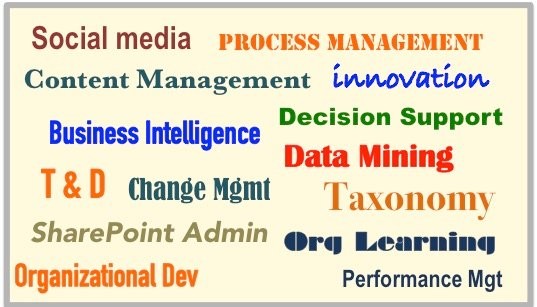
That's Not Knowledge Management!
Every time I receive a new copy of KM World, I look at the first page and inevitably think the same thing: is that KM? Of course I understand, as a magazine, it's useful for them to cast their net very widely, to encompass many topics and interest groups. It increases their circulation.
But we KM practitioners face a conundrum. When a client asks us about a hot, new technology, we have to ask ourselves the same questions: What's KM? What isn't? Do we need to pull up stakes and expand the fences around the KM ranch?
A few years ago, in creating a KM Consulting Practice Plan, I attempted a Venn Diagram that depicted "Knowledge-Related Management Services." But one glance at the graphic above tells you how much I missed. With the perspective of just a few years, my vision now seems quaint, even naive.
There's no question about it: the field of "knowledge-related" services and products is crowded. Just think: I didn't even include Social Media or Web 2.0 in the Venn diagram.
So how do we decide what is KM and what isn't? You may think the question is difficult to answer. You're wrong. It's impossible to answer.
Why? Because knowledge management is still evolving. At any moment in time, we can only approximate its dimensions.
Like a quantum particle, the act of observing it changes our own perception of it. (Okay, I'll retract that last statement; it's insufferably pretentious!)
But the truth is, in recent years, KM has moved through at least three major phases. In each phase, KM changed, but it did not abandon its previous capability. Instead, it added new capabilities and concerns.
A few years ago, Nancy Dixon discussed these in the context of Army KM, using a wonderful chart. I will reproduce the chart, and explain it in a coming post.
In the meantime, remember: be careful when you say "That's not KM." In another couple of years, it will be KM.
Or at least that's what they'll say in KM World!

Founder & CEO of KYield. Pioneer in Artificial Intelligence, Data Physics and Knowledge Engineering.
9yWe not only live in a rapidly changing environment, the systems and technology can now finally keep up with our continuously changing needs--at least for the few in sufficiently fluid organizations that can adapt quickly. I think this topic is a bit easier to grasp if we drop the M for a moment and look at just how to optimize the K tailored to the needs of each entity given dynamics between each are constantly changing. That's what I've done with my life for many years now--though frustratingly U.S. gov't is still lagging way behind in most agencies when we take a look--rest of world marches on. Cheers, MM
Manager, Research Information Services at Pacific Northwest National Laboratory
9yI came to KM after many years working in libraries. What struck me was how KM is a *perspective* rather than a specific set of tools. I often describe it as the intersection of Library & Information Science, IT, and HR (specifically Org Development and Org Learming.) In every case, it is about enabling people to learn faster by more easily sharing and reusing organizational knowledge. This requires,at minimum, breaking down silos and being able to find expertise. I'll also note that my biggest frustration in the last year while I was job hunting was the old school focus of KM as an IT thing. KM isn't Oracle or Sharepoint - those are tools of the trade, not the sole focus of a KM practioner. KM World doesn't really dispel this perception with their regular focus on software packages either, although one can discern the usefulness of these tools as a practioner.
Passionate about Innovation, Digital and Cultural Transformation, particularly in the Retail sector, from consumer goods to fashion and luxury products.
9yi fully agree as well but too many KM professionals seem to be stuck in the past (even if recent past). One of the latest addition to the KM goody bag is collaboration (mainly but mot exclusively) through so called social media
Neil, I like your observations... and the diagram helps to expose how tissue-thin are the boundaries between some of these concepts. I'm not sure it's valid to say a definition cannot be had merely because the concept is evolving... a persisting definition would be difficult or, as you say, impossible. I think if I were to try to resolve some of the system boundary issues I'd start by replacing the labels with 'purpose', and try to differentiate the concepts on that basis: either purpose or replace the one phrase (label, purpose) with 2 - 3 core concepts at the level below the label. It would make a busy chart but, perhaps, a more meaningful one.
Technical Librarian at Tractors and Farm Equipment Limited (Superannuated)
9yKM definitely is not collecting information all around the world. It has to be made cost effective/ saving by making the internal collective knowledge accessible for "reuse". I think "reuse" is the key. If that was not the case, why corporate houses would show interest in investing. Employees need not re-invent the wheel.